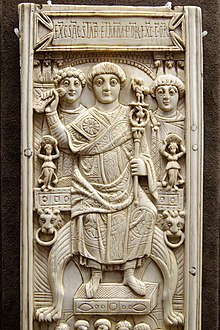This article needs additional citations for verification. (April 2019) |
The examples and perspective in this article deal primarily with Europe and do not represent a worldwide view of the subject. (January 2022) |
| Millennium: | 1st millennium |
|---|---|
| Centuries: | |
| Decades: | |
| Years: |
| 512 by topic |
|---|
| Leaders |
| Categories |
| Gregorian calendar | 512 DXII |
| Ab urbe condita | 1265 |
| Assyrian calendar | 5262 |
| Balinese saka calendar | 433–434 |
| Bengali calendar | −81 |
| Berber calendar | 1462 |
| Buddhist calendar | 1056 |
| Burmese calendar | −126 |
| Byzantine calendar | 6020–6021 |
| Chinese calendar | 辛卯年 (Metal Rabbit) 3209 or 3002 — to — 壬辰年 (Water Dragon) 3210 or 3003 |
| Coptic calendar | 228–229 |
| Discordian calendar | 1678 |
| Ethiopian calendar | 504–505 |
| Hebrew calendar | 4272–4273 |
| Hindu calendars | |
| - Vikram Samvat | 568–569 |
| - Shaka Samvat | 433–434 |
| - Kali Yuga | 3612–3613 |
| Holocene calendar | 10512 |
| Iranian calendar | 110 BP – 109 BP |
| Islamic calendar | 113 BH – 112 BH |
| Javanese calendar | 398–400 |
| Julian calendar | 512 DXII |
| Korean calendar | 2845 |
| Minguo calendar | 1400 before ROC 民前1400年 |
| Nanakshahi calendar | −956 |
| Seleucid era | 823/824 AG |
| Thai solar calendar | 1054–1055 |
| Tibetan calendar | 阴金兔年 (female Iron-Rabbit) 638 or 257 or −515 — to — 阳水龙年 (male Water-Dragon) 639 or 258 or −514 |

Year 512 (DXII) was a leap year starting on Sunday (link will display the full calendar) of the Julian calendar. In the Roman Empire, it was known as the Year of the Consulship of Paulus and Moschianus (or, less frequently, year 1265 Ab urbe condita). The denomination 512 for this year has been used since the early medieval period, when the Anno Domini calendar era became the prevalent method in Europe for naming years.